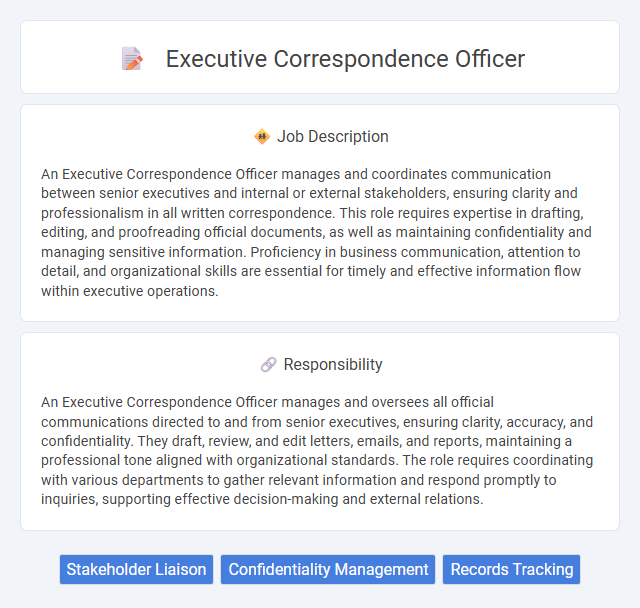
An Executive Correspondence Officer manages and coordinates communication between senior executives and internal or external stakeholders, ensuring clarity and professionalism in all written correspondence. This role requires expertise in drafting, editing, and proofreading official documents, as well as maintaining confidentiality and managing sensitive information. Proficiency in business communication, attention to detail, and organizational skills are essential for timely and effective information flow within executive operations.
Individuals with strong attention to detail and excellent communication skills are likely to excel as Executive Correspondence Officers. Those who thrive in structured environments and can manage confidential information discreetly might be more suitable for this role. People who prefer dynamic, high-pressure situations may find this job less aligned with their strengths.
Qualification
An Executive Correspondence Officer typically requires a bachelor's degree in communications, business administration, or a related field, with strong proficiency in written and verbal communication skills. Expertise in managing high-volume correspondence, attention to detail, and experience with office software and document management systems are critical qualifications. Prior experience in executive support or administrative roles enhances the ability to handle confidential information and coordinate effectively with senior management.
Responsibility
An Executive Correspondence Officer manages and oversees all official communications directed to and from senior executives, ensuring clarity, accuracy, and confidentiality. They draft, review, and edit letters, emails, and reports, maintaining a professional tone aligned with organizational standards. The role requires coordinating with various departments to gather relevant information and respond promptly to inquiries, supporting effective decision-making and external relations.
Benefit
The role of an Executive Correspondence Officer may offer significant benefits such as enhancing communication skills and providing exposure to high-level organizational processes. There is a strong likelihood of career advancement due to close interaction with senior executives and diverse departments. Job security and competitive compensation could also be attractive aspects, given the specialized nature of the position.
Challenge
The role of an Executive Correspondence Officer likely involves managing high volumes of sensitive communication, which can be challenging due to the need for precision and confidentiality. Balancing competing deadlines and ensuring clarity in responses may increase the probability of encountering stress and demanding work situations. Effective organizational skills and attention to detail are probably essential to navigate these challenges successfully.
Career Advancement
Executive Correspondence Officers play a crucial role in managing high-level communication and ensuring clarity in correspondence for senior executives, which hones skills in strategic communication and organizational leadership. Mastery in drafting, editing, and managing confidential information opens pathways to senior administrative roles such as Executive Assistant to C-suite leaders or Corporate Communications Manager. Continuous professional development and proficiency in digital communication tools significantly enhance career advancement opportunities within corporate and governmental sectors.
Key Terms
Stakeholder Liaison
An Executive Correspondence Officer plays a critical role in managing communication between the organization and its key stakeholders, ensuring clear and timely information exchange. Their expertise in stakeholder liaison involves coordinating with government agencies, corporate partners, and community representatives to address inquiries and facilitate collaborative initiatives. Proficient in handling sensitive information, they maintain strong relationships that support organizational goals and enhance reputation management.
Confidentiality Management
An Executive Correspondence Officer ensures strict confidentiality management by handling sensitive information with discretion and adhering to data privacy protocols. This role involves meticulously reviewing and securely processing classified documents, safeguarding against unauthorized access. Proficiency in encryption tools and compliance with organizational confidentiality policies are essential to maintain trusted communication channels.
Records Tracking
An Executive Correspondence Officer specializes in managing and tracking sensitive records to ensure accurate documentation and timely responses. Utilizing advanced records tracking systems, they monitor incoming and outgoing correspondence to maintain regulatory compliance and streamline communication workflows. Their expertise in record management enhances organizational efficiency by safeguarding critical information and supporting executive decision-making processes.
 kuljobs.com
kuljobs.com